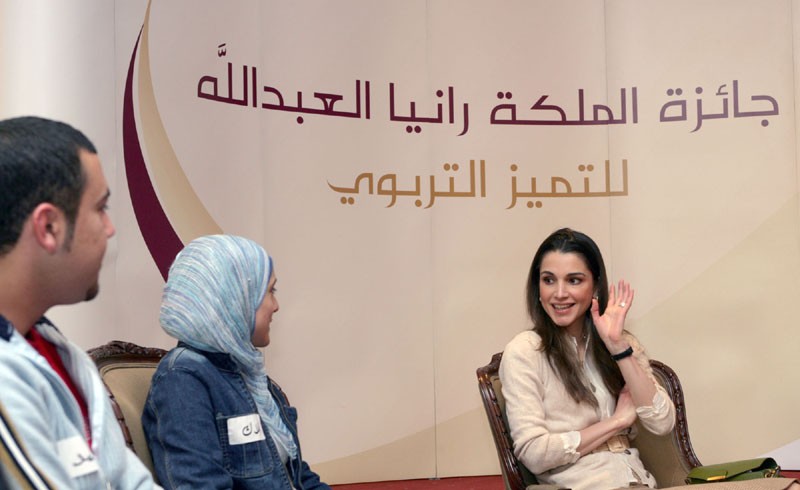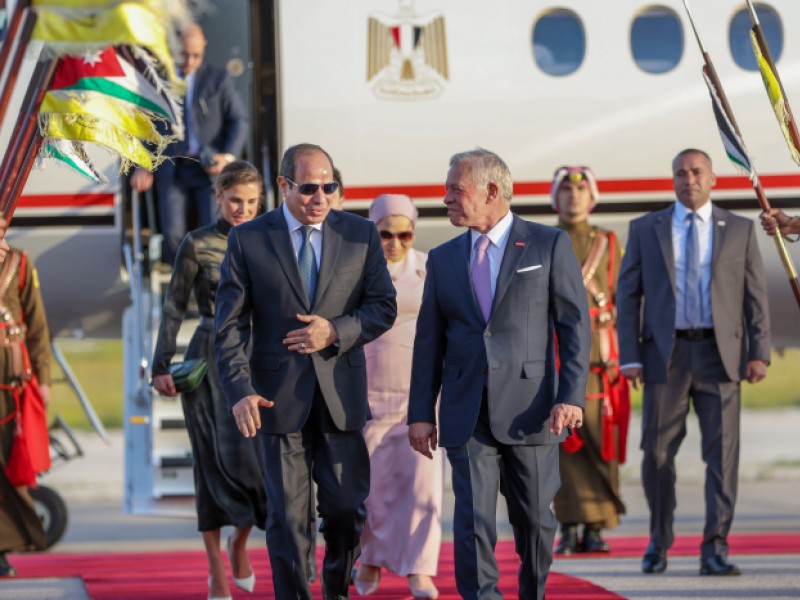Students Brief Queen Rania on Necessary Qualities of a Distinguished Teacher During the Queen Rania Excellence Award for Teaching Logo Launch

(Jordan Times, Mohammad Ghazal - Amman) Her Majesty Queen Rania joined public high school students from around the Kingdom in Amman on Sunday in a discussion during which they briefed her on their criteria for a distinguished teacher. The meeting took place during the launch of the logo for the Queen Rania Excellence Award for Teaching, which is dedicated to distinguished teachers this year. During the discussion with the students, who took part in workshops to determine the characteristics of a distinguished teacher, the Queen underlined the importance of a teacher's role in developing students' methods of thinking. “The teacher is the one who is capable of making available a suitable atmosphere for the students to learn regardless of the availability of educational tools,” she told the students, adding that the award is meant to encourage teachers to enhance their capabilities and skills. Students shared with the Queen the qualities they felt define a distinguished teacher, including honesty in conveying information, acceptance of criticism and capability of dialogue. The students also said that distinguished teachers should keep up to date with the latest technologies, be facilitators in the educational process rather than spoon-feeding information, and must be in tune with students' needs. Minister of Education and Minister of Higher Education and Scientific Research Khalid Touqan explained that, while this year the award will highlight distinguished teachers, in the future the scope would be expanded. “The theme of this year's award will be for distinguished teacher and each year there will be a new, different theme under the award such as the distinguished student, principal or educational supervisor,” Touqan told reporters yesterday. Earlier in the day, the Queen met with the award's steering committee, which includes members from the Ministry of Education, the private sector, nonprofit companies and representatives from the Queen's office. The committee briefed Her Majesty on the standards of the award and its goals. The minister said that the award seeks to develop teaching, encourage society's appreciation of educators, lift the morale of the instructors and motivate them to excel. According to Touqan, the award will be granted to a winner in each of the five following categories: Kindergarten through 3rd grade, 4th through 8th grades, 9th through 10th grades, secondary school teachers in the academic stream, and secondary school instructors in the vocational stream. Award recipients will receive a certificate and a cash prize, and the winner will likely be promoted on the civil service scale, according to the minister. Applications will be accepted as of April 1, 2006, while the award winners will be announced on Oct. 5, 2006, in conjunction with Teacher's Day in the Kingdom. Eligible educators must teach in the country's public schools and have at least three years of experience. They must also be full time instructors. According to official figures, there are more than 50,000 teachers in the Kingdom's public schools. Touqan explained that after teachers apply, the award's evaluation committee — to be formed soon — would assess the applications, which should include the teachers' achievements and success stories. The committee will then carry out field visits to review these achievements on the ground. The minister pointed out that an independent committee is supervising the award. Excellence Award for Teaching Evaluation criteria 1. Personal philosophy and crucial values of the teacher. 2. Efficiency and independence of education. 3. Resource management. 4. Professional development. 5. Parents and local society participation. 6. Work relationships and interacting with others. 7. Creativity and innovation. 8. Evaluation and assessment. 9. Outcomes and achievements. Objectives 1. Contributing to the development of education to graduate intellectual and students devoted to their community. 2. Increasing society's appreciation for the role of teachers and lifting the spirit of teachers. In addition, encouraging more enthusiasm for the profession. 3. Facilitating the exchange of creative ideas and encouraging interaction between parties carrying out an essential role in education. 4. Enhancing the benefits of education after the educational stage by relating what students learn in school with their practical lives. 5. Providing a model for teachers and schools to help them achieve excellence and improvement. 6. Honouring distinguished teachers and evaluating them according to subjective and scientific standards and transparency. 7. Highlighting the importance of interaction between schools and their local environment.
Jordan Times, Monday, March 6, 2006
Featured
Queen Rania's official website
This website does not support old browsers. To view this website, Please upgrade your browser to IE 9 or greater
Your browser is out of date. It has known security flaws and may not display all features of this and other websites. Learn how to update your browser



